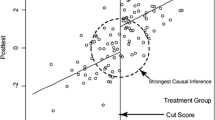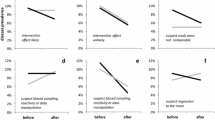Abstract
In a setting of long-standing, community-wide and generally accepted prevention activities like youth health care services in The Netherlands, evaluative research in the form of experimental studies is hardly possible. Furthermore, as most interventions will bear fruit only after several years and the effects are often described in rather vague terms, even non-experimental study designs are fraught with possible difficulties. Although a study design using aggregate data is generally considered inferior or ‘incomplete’, in many cases, especially in health services research, this approach can be the only one feasible to evaluate the effectiveness of preventive programmes and interventions. In this article we present the ecologic case-referent design as a potentially expedient and valid method for estimating the ecologic effect of a population-wide intervention on the outcome rate in those populations. In this case-referent design, many variables are measured at the individual level, whereas the main exposure variable is measured at an aggregate or ecologic level. Using recently published studies as an example, the advantages and drawbacks of the design are discussed using the randomised controlled trial design as the referent study design.
Similar content being viewed by others
References
Snow J. On the Mode of Communication of Cholera. 2nd ed. London: John Churchill, 1860.
Girard DZ. Intervention times series analysis of pertussis vaccination in England and Wales. Health Policy 2000; 54: 13–25.
Fine PE, Clarkson JA. Individual versus public priorities in the determination of optimal vaccination policies. Am J Epidemiol 1986; 124: 1012–1020.
Wiegersma PA. Long term e.ects of preventive activities of youth health care for school children in The Netherlands [dissertation], University of Nijmegen, Nijmegen, 1999.
Wiegersma PA, Hofman A, Zielhuis GA. The e.ect of school screening on surgery for adolescent idiopathic scoliosis. Eur J Public Health 1998; 8: 237–241.
Jacobson TA. ‘The lower the better’ in hypercholesterolaemia therapy: A reliable clinical guideline? Ann Intern Med 2000; 133: 549–554.
Munro J, Coleman P, Nicholl J, Harper R, Kent G, Wild D. Can we prevent accidental injury to adolescents? A systematic review of the evidence. Inj Prev 1995; 1: 249–255.
Lynam DR, Milich R, Zimmerman R, et al. Project DARE: No e.ects at 10-year follow-up. J Consult Clin Psychol 1999; 67: 590–593.
Pijpers FIM. Schoolgezondheidsbeleid in het basisonderwijs [School Health Policy at schools for primary education] [dissertation], University of Leiden, Leiden, 1999.
Cohen BL. Health e.ects of radon from insulation of buildings. Health Phys 1980; 39: 937–941.
de Weerdt I, Jonkers R, Spapen S. De gezonde school en genotmiddelen (Healthy schools and stimulants) Instituut voor Gezondheids-en Omgevingsmaatregelen (IGO), Haarlem, 1995.
Wiegersma PA, Hofman A, Zielhuis GA. Prevention of suicide by youth health care. Public Health 1999; 113: 125–130.
Tengs T, Adams M, Pliskin J, et al. Five-hundred lifesaving interventions and their cost-e.ectiveness. Risk Analysis 1995; 15: 369–390.
Ouwehand LM, Bergink AH, de Moel M, Hirasing RA. Bibliogra.e Jeugdgezondheidszorg 1998–1999 (Review of the available literature on youth health care 1998–1999). TNO Prevention and Health, Leiden, dy2000.
Wagner JL. Cost-e.ectiveness of screening for common cancers. Cancer Metastasis Rev 1997; 16: 281–294.
van der Weijden T, Knottnerus JA, Ament AJ, Stoffers HE, Grol RP. Economic evaluation of cholesterol-related interventions in general practice. An appraisal of the evidence. J Epidemiol Community Health 1998; 52: 586–594.
Cheatle TR. The case against a national screening programme for aortic aneurysms. Ann R Coll Surg Engl 1997; 79: 90–95.
Relman AS. Assessment and accountability. The third revolution in medical care. N Engl J Med 1988; 318: 1220–1222.
Black N. Health services research: Saviour or chimera? Lancet 1997; 349: 1834–1836.
Black N. Why we need observational studies to evaluate e.ectiveness of health care. Br Med J 1996; 312: 1215–1218.
Hennekens CH, Buring JE. Observational evidence. Doing more good than harm: The evaluation of health care interventions. Ann NY Acad Sci 1994; 703: 18–24.
Lilford RJ, Jackson J. Equipoise and the ethics of randomization. J R Soc Med 1995; 88: 552–559.
Editorial. Cross design synthesis: A new strategy for studying medical outcomes? Lancet 1992; 340: 944–946.
Johnston MV, Ottenbacher KJ, Reichardt CS. Strong quasi-experimental designs for research on the e.ectiveness of rehabilitation. Am J Phys Med Rehabil 1995; 74: 383–392.
Schultz KF, Chalmers I, Hayes RJ, Altman DG. Empirical evidence of bias. Dimensions of methodological quality associated with estimates of treatment e.ects in controlled trials. JAMA 1995; 273: 408–412.
Kleinbaum DG, Kupper LL, Morgenstern H. Epidemiologic Research: Principles and Quantitative Methods. New York: Van Nostrand Reinhold, 1982.
Rothman KJ, Greenland S (eds). Modern Epidemiology. Philadelphia: Lippincott-Raven Publishers, 1998.
Schultz KF. Subverting randomization in controlled trials. JAMA 1995; 274: 1456–1458.
Miettinen OS. Theoretical Epidemiology. Principles of Occurrence Research in Medicine. New York: Delmar Publishers Inc., 1985.
Wiegersma PA. Prevention of mental health problems by youth health care in The Netherlands. In: Long Term E.ects of Preventive Activities of Youth Health Care for School Children in The Netherlands [dissertation], Nijmegen: University of Nijmegen, 1999.
Wiegersma PA, Hofman A, Zielhuis GA. Prevention of unhealthy behaviour by youth health care. J Public Health Med 2000; 22: 386–392.
Diez-Roux A. Bringing context back into epidemiology: variables and fallacies in multilevel analysis. Am J Public Health 1998; 88: 216–222.
Weinberg CR, Umbach DM, Greenland S. When will nondi.erential misclassi.cation of an exposure preserve the direction of a trend? Am J Epidemiol 1994; 140: 565–571.
Thomas, DC. Re: ‘When will nondi.erential misclassification of an exposure preserve the direction of a trend?’. Am J Epidemiol 1995; 142: 782–783.
Birkett, NJ. Re: ‘When will nondi.erential misclassification of an exposure preserve the direction of a trend?'. Am J Epidemiol 1995; 142: 783–784.
Blakely T, Woodward A. Ecological e.ects in multilevel studies. J Epidemiol Community Health 2000; 54: 367–374.
Pearce N. Traditional epidemiology, modern epidemiology and public health. Am J Public Health 1996; 86: 678–683.
Susser M, Susser E. Choosing a future for epidemiology, II: from black box to Chinese boxes and eco-epidemiology. Am J Public Health 1996; 86: 674–677. Address for correspondence: Pieter A. Wiegersma, Department of Social Medicine, University of Groningen, A. Deusinglaan 1, 9713 AV Groningen, The Netherlands Phone: +31-50-3636850; Fax: +31-50-3636251 E-mail: p.a.wiegersma@med.rug.nl 557
Author information
Authors and Affiliations
Rights and permissions
About this article
Cite this article
Wiegersma, P.A., Hofman, A. & Zielhuis, G.A. Evaluation of community-wide interventions: the ecologic case-referent study design. Eur J Epidemiol 17, 551–557 (2001). https://doi.org/10.1023/A:1014568930992
Issue Date:
DOI: https://doi.org/10.1023/A:1014568930992




